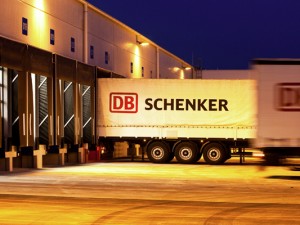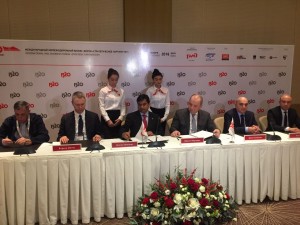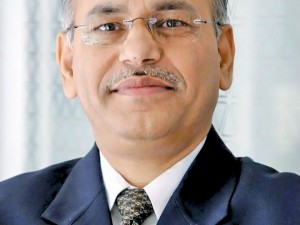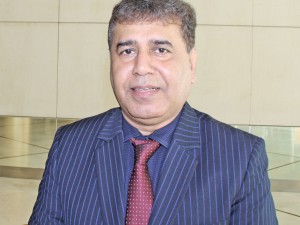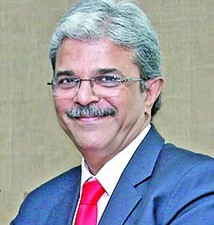Kashipur Infrastructure & Freight Terminals (KIFTPL), a Joint Venture between Apollo LogiSolutions Limited (ALS) and Indian Glycols Limited (IGL), has launched first EXIM (Export-Import) train from Inland Container Depot (ICD) Kashipur. Ajay Tamta, Minister of State for Textiles, Government of India flagged off the train covering connecting Kashipur with Mundra port. The EXIM train will be servicing all gateway port/ports like Mundra and Pipavav. The state-of-the-art private freight terminal in Kashipur, Uttarakhand, is spread over 41 acres of land, to cater the logistics requirements of region. Nearly 84 rakes of domestic transportations equivalent to 15000 TEUs of throughput has already taken place from this terminal since its operation. Raaja Kanwar, Vice Chairman & Managing Director, Apollo International said, “This is a significant step towards building integrated logistics capabilities to provide better facilities to our hinterland customers in the near future.”
Read More »DB Schenker extends its LANDbridge product to the Indian subcontinent
DB Schenker has announced the launch of its LANDbridge product in the Indian subcontinent. The international road service from the company’s road portfolio in Asia Pacific has grown with the recent Bangalore-Dhaka cross-border shipments piloted with Linde Gas India. This 2,000 km road routing involved passage through three different Indian states and clearance procedures at the Petrapole-Benapole border to enter the capital city of Dhaka. The coordination and establishment of the India-Bangladesh route opens the door to more possibilities in the region, enabling DB Schenker to cater to more industries and customers. Commenting on the development, Gregory Loh, Director, LANDbridge product, said, “The company’s focus on cross-border road solutions in Asia is not confined to Southeast Asia or China. DB Schenker is committed to push the envelope further afield and deliver solutions to more companies moving cargo within mainland Asia.”
Read More »FFFAI and JSC RZD Logistics sign agreement on North-South ITC development
JSC RZD Logistics and Federation of Freight Forwarders’ Associations in India (FFFAI) have signed an agreement on strategic partnership aimed to coordinate efforts in development of the North-South ITC (International Transport Corridor). JSC RZD Logistics and FFFAI agreed to work together to expand the number of contacts with Russian and Indian freighters in order to attract the cargos to the North-South ITC. They are planning to develop Russian-Indian logistics cooperation as well. The signing of the agreement took place during the International Rail Business Forum ‘1520 Strategic Partnership: The Caspian Region’.
Read More »Budget 2017-18 will help in entering remote locations: PC Sharma
PC Sharma, CEO and whole time director, TCIEXPRESS, notes, “The budget allocation of Rs 39,61,354 crore on infrastructure development and of selected airports in Tier 2 & 3 cities will help us penetrate in strategic and remote locations, enhancing our services in those regions as well. The focus on infrastructure development in the budget will contribute towards the exponential growth of logistics industry, as it will help in robust operations and efficient deliveries, particularly for the express delivery sector. We are also optimistic about the timely implementation of GST, which was also mentioned in the budget.”
Read More »Infrastructure development to elevate logistics: Sarini Sachdeva
Expressing hope, Sarini Sachdeva, CEO, Aardour Worldwide Logistics says, “The announcement of Rs 39,61,354 crore on infrastructure development will help the logistics industry to grow much faster. Today, infrastructure forms the major reason that logistics industry is lagging behind.” “Moreover, for any country, air connectivity to undeserved and unserved regions could provide impetus to economic development and growth of such regions, and contribute to a more uniform and equitable growth in economic activity across the country. Per capita flights in India is about 0.08 compared with around 2.5 and three in the US and the UK, respectively. India has about 450 airports and airstrips but only 75 have scheduled operations, as per the recently unveiled national civil aviation policy,” she informs. “Around 66.5 per cent of India’s total air traffic comes from Delhi, Mumbai, Bengaluru, Chennai, Kolkata and Hyderabad airports. These six cities would require new airports by 2025-26 and in some cases, much earlier. Currently, cargo from smaller airports fly to big cities. Once the smaller airports became viable the industries in Tier 2 and Tier 3 will also flourish,” Sachdeva adds.
Read More »Moves are good but are they for cargo also, asks Ravinder Katyal
Ravinder Katyal, Director Air Freight & Co-Load – ISC, DSV Air & Sea, says, “This Union Budget will allow businesses to run through, closer by airports and thereby decentralise the process and save the logistics cost. However, we really need to review that will the investment of Rs 39,61,354 crore on infrastructure development help improve the commercial/cargo facilities or not and the development of Tier II Airports on PPP mode will be for cargo also or only for passenger terminals. (If the same happens for cargo too, this will help better control or lower logistic cost and automatically time will be saved as the facilities will be close to their manufacturing hubs).”
Read More »If not much, then not bad also for logistics: Ashish Mahajan
With a feeling of optimism, Ashish Mahajan, Managing Director, Landmark Logistics considers it as a pro-growth budget. “No bad news for the sector could be considered as a good budget and same goes for the logistics industry. There is no change in service tax and reduction in service tax on railway haulage is a good news. No major change in customs duties, allocation for National Highways stepped up and airports in Tier- II cities, will directly or indirectly boost the logistics sector of the country,” he believes.
Read More »Infrastructure push and private investment will develop the logistics: Harpreet Singh Malhotra
“In this Union Budget, an infrastructure push along with investment and consumption-led growth presented as the key priority areas for the government. This is quite expected that the government will do required developments for infrastructure and logistics sectors. PPP & ‘Make in India’ is always counted first on the fingertips of the government. As expected this Union Budget indicates that public investment does help in crowding in private investment. Sectors such as automobiles, cement, steel, paper, aluminium and fertilisers, which had the lowest capacity utilisation and were among the sectors that have been the ones hardest hit by demonetisation, are on a special focus by the government,” says “Announcements like total allocation of Rs 39,61,354 crore on infrastructure development, development of selected airports in Tier 2 & 3 cities on PPP mode, etc., will help the logistics industry to grow further. The government has shown its support investment directly by spending more on infrastructure, particularly roads and affordable housing. This will also help raise demand for core sectors such as steel and cement. Construction of roads and low-cost housing is highly labour intensive in India, which will also help generate employment in the economy,” he adds.
Read More »It is a growth-oriented budget: Samir J Shah
Samir J Shah, Chairman, FFFAI believes, “The recent bold steps from the government pertaining to fiscal discipline, restructuring of tax regime, capacity building through setting up of appropriate infrastructure and connectivity have further been strengthened by the Budge 2017-18 announcements. For instance, budgetary allocation of Rs 2,41,387 crore for multimodal transportation sector, increase of allocation for highways from Rs 57,976 crore in 2016-17 to Rs 64,900 crore for 2017-18, identifying 2,000 kms of coastal connectivity roads for construction and development, more emphasis on agro- based produces through NABARD and appropriate logistics facilities for them, emphasis on MSME sector, port connectivity, Greenfield ports, airports in Tier-II & Tier-III cities through PPP mode, logistics parks, etc would have long-term and significant effects on India’s manufacturing and merchandise trade.” “Remarkably, the finance minister has announced the government’s decision to set up 1500 Multi Skill Training Institutes across the country. For these, Rs 1,700 crore has been allotted for FY 2017-18. This highlights the government’s firm commitments towards adding value to capacity building in a larger perspective. FFFAI, in its pre-Budget memorandum had urged the Finance Ministry to address the micro issues related customs clearance. We are optimistic that the finance minister’s commitments on ease of doing business would resolve those in the days to come,” he states.
Read More »Demonetising Currency: EICI appeals to extend exemption deadline for toll plazas
Express Industry Council of India (EICI) and its members welcomed the Prime Minister’s announcement to demonetise Rs 1,000 and Rs 500 notes. “There are some procedural issues that express companies have been facing while plying their vehicles carrying urgently required express shipments on the national high ways. The vehicles must pass multiple toll plazas and drivers carry cash to pay the toll charges,” says, Vijay Kumar, Chief Operating Officer, EICI. While every effort is being made by our members to ensure their drivers carry the new higher denomination notes as well as use other alternative payment systems available post November 11,2016, due to unprecedented rush in the banks as well as limits for cash withdrawals, it is turning out to be difficult to implement.
Read More » Cargo Breaking News
Cargo Breaking News

